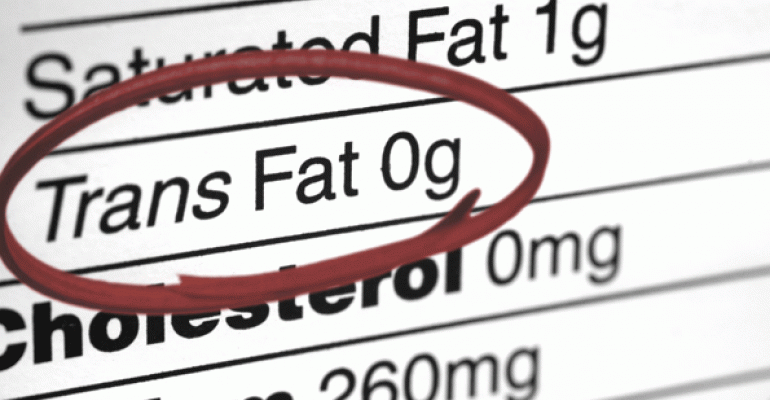A proposed ban by the Food and Drug Administration of partially hydrogenated oils (PHOs), the main source of trans fats, could require restaurants to reformulate many of their recipes for fried foods and baked goods, but much of the hard work was accomplished years ago, according to industry experts.
Earlier this month the FDA tentatively determined that PHOs are no longer “generally recognized as safe,” a designation necessary for an ingredient to be added to food without explicit FDA approval. The government agency is now seeking commentary from the public before making a final determination.
RELATED
• Long John Silver’s switching to trans-fat-free oil
• Restaurants' trans fat bans may have positive health effects
• More restaurant health and nutrition news
“The good news is that the oil companies have really done a lot of the work ahead and have produced trans fat–free oils that replicate the needed factors that the artificial trans fat oils were fulfilling,” said Aaron Noveshen, founder and president of The Culinary Edge, a restaurant and food business consulting company based in San Francisco.
Partially hydrogenated oils, made by treating oil with hydrogen gas, were added to food decades ago as a less expensive alternative to saturated fats, adding desirable mouth feel to baked goods and extending the shelf life of frying oils. They were also believed to be more healthful, but over the years evidence mounted that the artificial trans fats produced through partial hydrogenation contributed to cardiovascular disease.
The FDA determination does not include trans fats that occur naturally in some meat and dairy products.
Artificial trans fats have been under fire since the mid-1990s as evidence of their unhealthfulness grew. The FDA ruled in 2003 that packaged foods’ nutrition labels must list trans fat content, and in 2005, New York City became the first jurisdiction to ban artificial trans fats in restaurants. Cleveland, Philadelphia and other cities, along with the state of California, followed suit.
“Most companies have been trying to be trans fat free for awhile now,” said Roger Kaplan, head of Restaurant Innovations, a Dallas-based consulting firm. “That’s been a focus for a lot of companies and a lot of manufacturers.”
Noveshen said that many manufacturers, required to reformulate their products for some market, went ahead and made the changes systemwide.
Restaurants ahead of the ban
Some restaurants moved quickly, too, such as Beaumont, Texas-based Jason’s Deli. The chain, which now has 242-units, spent the better part of a decade eliminating partially hydrogenated oils from its menu. Jason’s Deli reformulated about 50 products, including its bread, and finally rolled out a menu free of trans fats in 2005, according to Pat Herring, the chain’s director of product and concept.
“It was in bread and crackers and oily things,” Herring said, noting that the hardest part was getting partially hydrogenated oils out of shelf-stable baked goods such as ice cream cones and the crackers at the salad bar. The chain also took production of the whipped topping for its strawberry shortcake in-house.
“All the whipped toppings at the time were fortified with shortening,” he said. So before the rollout they shipped tabletop mixers to each chain and had them whip the cream in-house.
“It was similar cost and a much, much better product,” Herring said.
Brooks Broadhurst, senior vice president of food at beverage at Eat ’n Park, a 71-unit family dining chain based in the Pittsburgh suburb of Homestead, Pa., said he spent around 18 months removing artificial trans fats in the middle of the last decade. He said he spent time with his oil supplier and Pennsylvania State University to test different frying oils, and then got to work reformulating the chain’s signature Smiley Cookie, which Eat ’n Park makes in its own commercial bakery.
“We basically just did it, and didn’t make any noise about it, because we wanted to see if our customers noticed or not,” he said. “We didn’t have any customers say one way or another whether [the new formulations were] better or worse.”
Both Broadhurst and Herring said that adhering to a possible FDA ban on PHOs shouldn’t have much of a negative impact on restaurants. “It certainly is a lot easier to do today than it was eight or nine years ago,” Broadhurst said. “I think a lot of chains have already made the changes they needed to make because of local regulations or because of the push that was made in 2007, 2008, 2009 from a health standpoint.”
And since that time, more products free of trans fats have become available to restaurants, pointed out Herring. “There are way more products out there today than when we started,” he said, adding, “I wouldn’t be afraid of it. In the long term, I think you’re going to have higher quality food in your restaurant.”
Noveshen advised small chains that have not already eliminated PHOs to make sure they know what types of fats they’re using and change them if necessary. This will likely involve some recipe tweaking, he said, but they just need to work with their distributors to determine what alternatives are available.
“The stuff’s out there. They just have to do it,” he said.
Contact Bret Thorn at [email protected].
Follow him on Twitter: @foodwriterdiary

